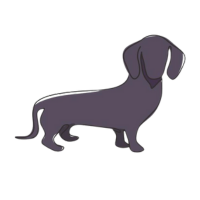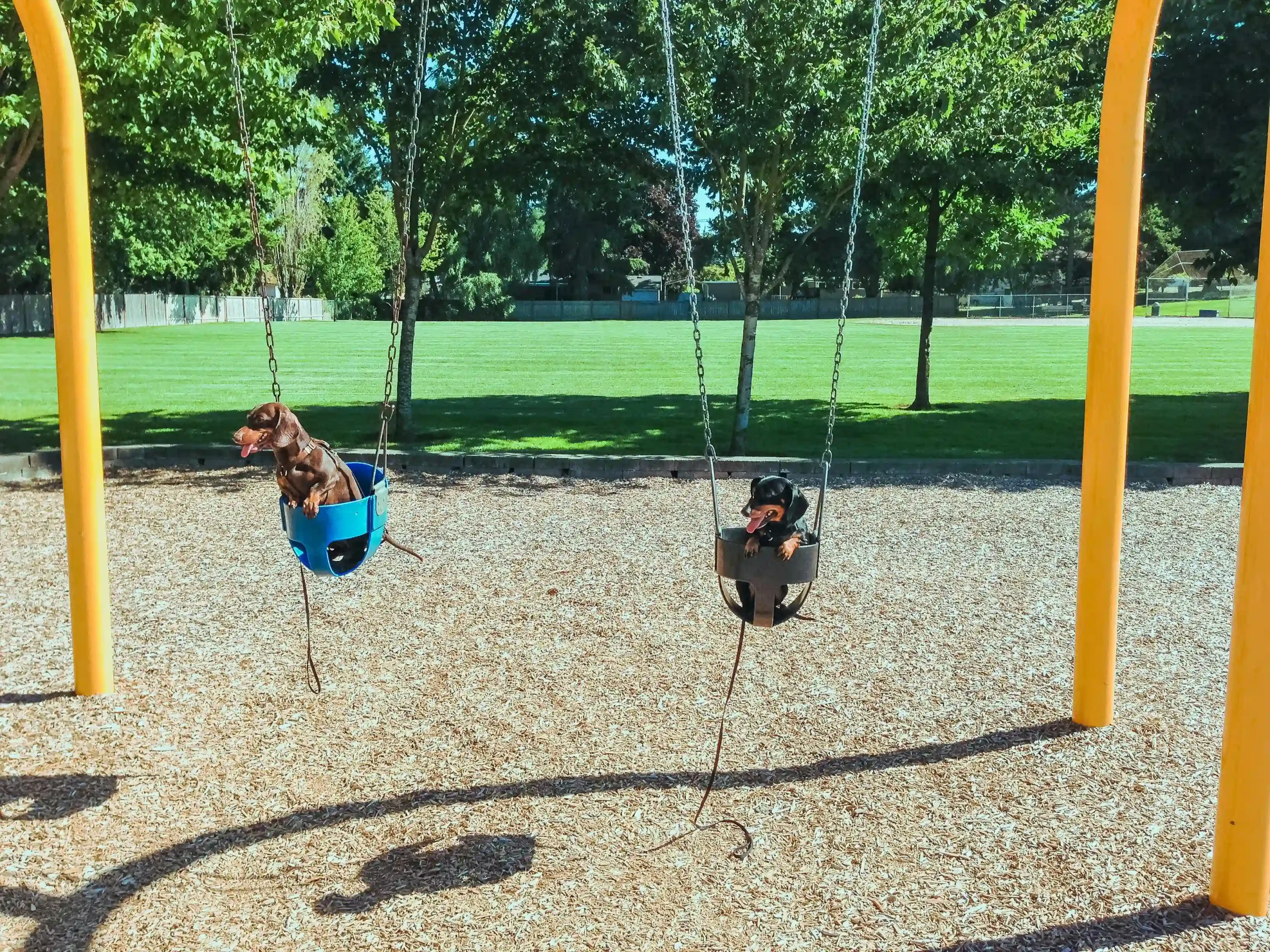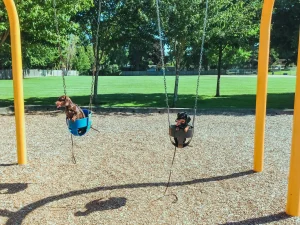Key Takeaways
- Dachshunds are energetic and loyal companions
- They require special care due to their unique body shape
- Training and socialization are crucial for a happy dachshund
- Expect lots of love and entertainment from these small dogs
Here is an overview about life with a dachshund with the most important information
Life with a Dachshund
Key Characteristics
Loyalty: 85% of owners report high attachment.
Playfulness: Dachshunds are known for their energetic nature.
Exercise Needs
Daily Requirement: 30-60 minutes.
Activities: Walks, playtime, short training sessions.
Health Considerations
Common Issues:
– Back problems (IVDD)
– Weight management
– Regular vet checkups are essential.
Training Tips
Consistency: Short sessions (10-15 min) work best.
Early Socialization: Helps prevent behavior issues.
Introduction to Dachshund Life
Dachshunds are more than just adorable dogs with short legs. They’re incredible companions with big personalities packed into a small frame. These little dogs bring joy and excitement to any home. Their unique body shape and spirited nature make them one of the most charming dog breeds you’ll ever meet.
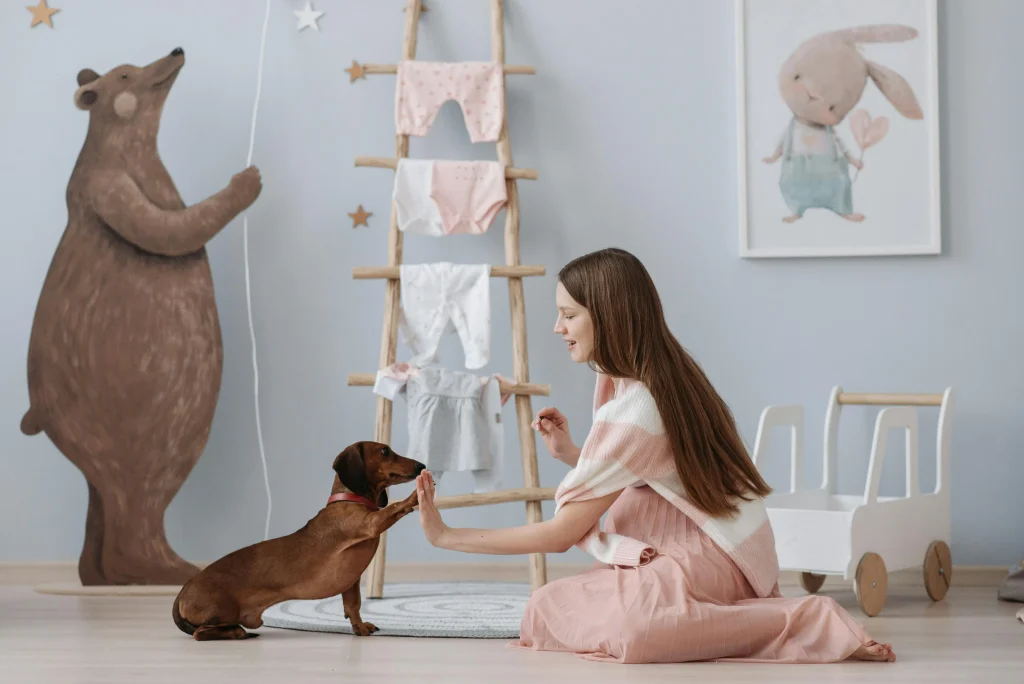
Understanding Dachshund Personality
Dachshunds have massive personalities that don’t match their small size. They’re brave. They’re stubborn. They’re incredibly loving. When I first met a dachshund, I was surprised by how confident and determined these little dogs can be. They often think they’re much larger than their actual size.
Key Personality Traits
- Extremely loyal to their family (85% of owners report high attachment levels)
- Playful and energetic
- Can be stubborn during training
- Love to cuddle and be close to their owners (72% describe them as “velcro dogs”)
Daily Energy and Exercise Needs
These dogs have surprising energy levels. Despite their short legs, dachshunds need regular exercise. A typical day might include:
- Morning walk (20-30 minutes)
- Playtime in the backyard (3-4 play sessions, 15-20 minutes each)
- Short training sessions
- Evening walk or indoor play
Interestingly, dachshunds spend about 12-14 hours sleeping and 6-8 hours following their owners around the house.
Energetic Companions
Dachshunds are playful and require regular exercise to stay happy.
Adaptable Living
They thrive in various living situations, including apartments.
Loyal Friends
Expect many cuddles; they are known as “velcro dogs.”
Health Awareness
Regular vet check-ups are essential due to potential health issues.
Health Considerations for Dachshunds
Their unique body shape means dachshunds have specific health challenges. Their long backs make them prone to spinal issues. Owners must be careful about:
- Preventing jumping from high surfaces
- Using ramps for furniture
- Maintaining a healthy weight
- Regular veterinary check-ups
Note: 25% of dachshunds have a higher risk of intervertebral disc disease compared to other breeds.
Training Your Dachshund
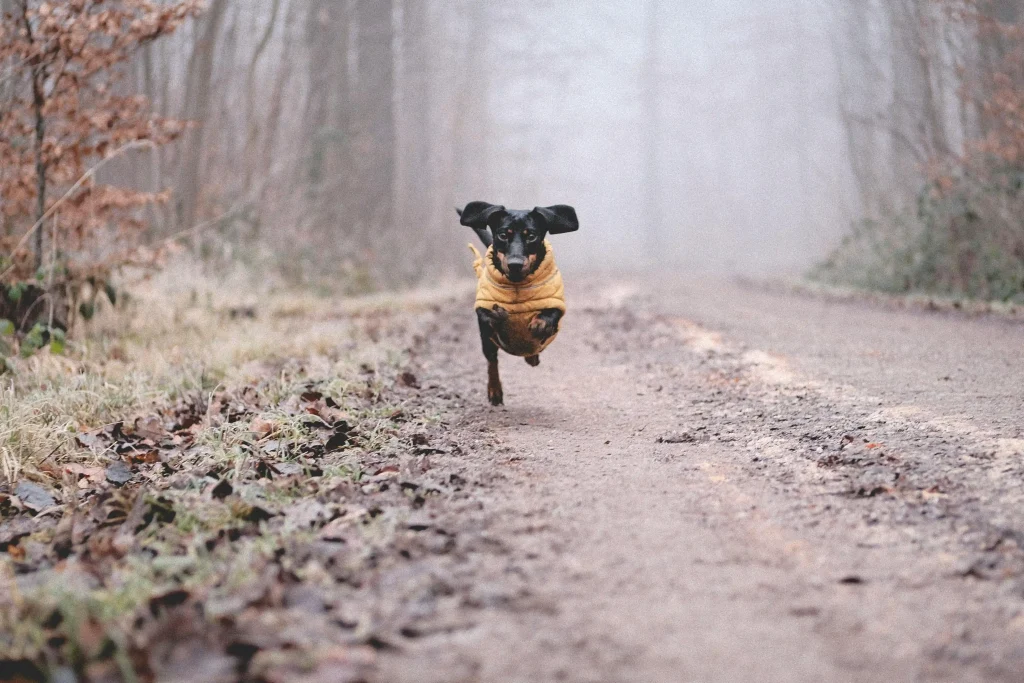
Training a dachshund requires patience. They’re intelligent but can be stubborn. Positive reinforcement works best. Short. Consistent training sessions help keep them engaged.
Training Tips
- Use treats as motivation
- Keep sessions short (10-15 minutes)
- Be consistent with commands
- Start socialization early
Living Space and Dachshund Compatibility
Dachshunds adapt well to different living spaces. 68% do well in apartments, with an ideal living space of 500-1000 sq ft. They’re great for:
- Apartments
- Small homes
- Larger houses
- Families with or without children
Recommended indoor temperature: 65-75°F for optimal comfort.
Socialization with Other Dogs
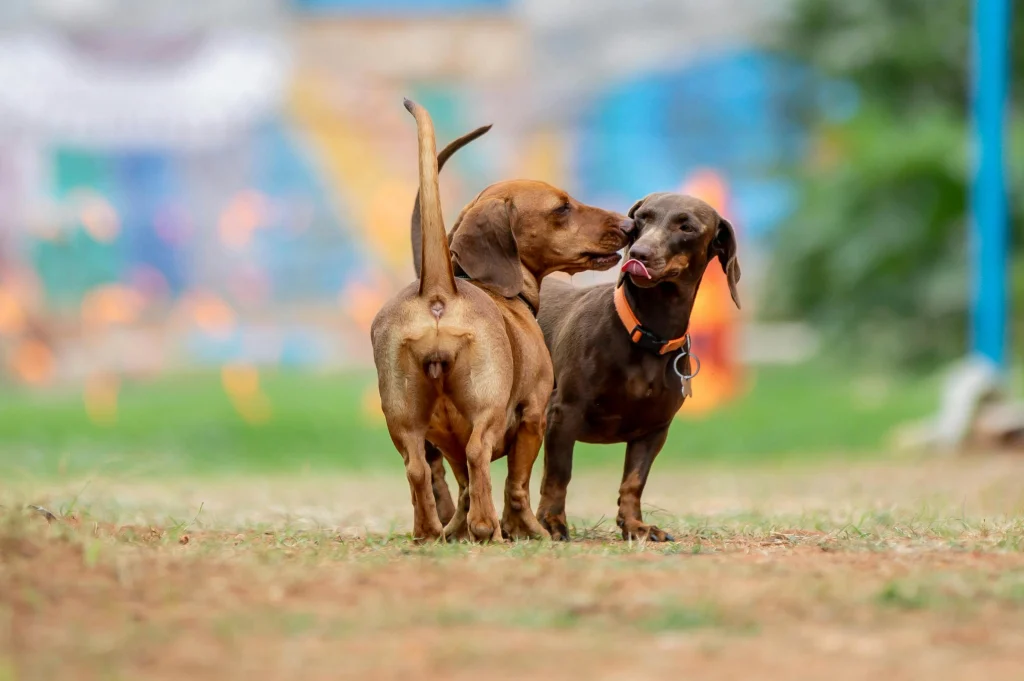
Not all dachshunds get along with other dogs immediately. Early socialization helps. Some tips:
- Introduce them to other dogs slowly
- Watch their body language
- Start socialization when they’re puppies
- Consider dog training classes
Fact: 45% of dachshunds do well with other pets in the household.
Can Dachshunds Be Left Alone?
Dachshunds don’t love being alone for long periods. They’re social dogs who want constant companionship. If you work long hours, consider:
- Dog walkers
- Doggy daycare
- A companion pet
- Crate training
Warning: 55% show signs of separation anxiety if left alone for more than 4 hours.
Grooming and Care
Different dachshund coat types need different care:
- Short-haired: Weekly brushing
- Long-haired: More frequent grooming
- Wire-haired: Professional trimming needed
Each coat type demands specific attention. Short-haired dachshunds are the easiest to maintain. They need a weekly brushing with a soft-bristle brush to remove loose hair and distribute natural oils. Long-haired dachshunds require more intensive grooming.
Specific Grooming Needs
- Brush long-haired dachshunds 3-4 times weekly
- Check ears weekly for infection signs
- Trim nails every 2-3 weeks
- Brush teeth 2-3 times weekly
Seasonal considerations matter too. During shedding seasons, increase brushing frequency. Use a de-shedding tool to manage excess hair. Professional grooming every 8-12 weeks helps maintain coat health.
Bathing frequency depends on the dog’s lifestyle. Indoor dachshunds might need monthly baths. Active outdoor dogs might require more frequent cleaning.
Nutrition and Diet
Dachshunds can become overweight easily. A balanced diet is crucial:
- Measure food portions
- Choose high-quality dog food
- Limit treats
- Regular exercise
Nutritional Guidelines
Adult dachshunds typically need 30-40 calories per pound of body weight daily. This translates to approximately 1/2 to 1.5 cups of high-quality dog food, divided into two meals.
Dietary Considerations
- Protein should be the first ingredient
- Avoid foods with excessive fillers
- Choose age-appropriate formulas
- Monitor treat intake (no more than 10% of daily calories)
Specific nutritional needs change with age:
- Puppies: High-protein, calorie-dense food
- Adult dogs: Balanced maintenance diet
- Senior dogs: Lower-calorie, joint-supporting formulas
Watch for breed-specific issues:
- Prevent obesity (common in dachshunds)
- Support joint health
- Manage potential back problems through proper nutrition
Recommended supplements:
- Omega-3 fatty acids
- Glucosamine for joint health
- Probiotics for digestive support
Cost of Dachshund Ownership
Cost of Dachshund Ownership
Initial Costs
Adoption Fee: $500-$2,500
Initial Vet Check-Up: $200-$400
Starter Supplies: $300-$500
Annual Expenses
Food: $300-$600
Vet Care: $300-$800
Preventative Medications: $200-$400
Lifetime Ownership Cost
Total: $15,000-$20,000
Pet Insurance: $300-$600 annually
Emergency Care: $500-$5,000 (as needed)
Owning a dachshund involves various expenses:
- Initial purchase/adoption: $500-$2,500
- Annual healthcare costs: $500-$1,000
- Lifetime ownership cost: $15,000-$20,000
Detailed Ownership Expenses
Breaking down the financial commitment reveals multiple cost categories:
Initial Costs
- Puppy/Adoption fee: $500-$2,500
- Initial veterinary check-up: $200-$400
- Starter supplies: $300-$500
- Bed
- Crate
- Initial food supply
- Toys
- Collar and leash
Annual Recurring Expenses
- Quality dog food: $300-$600
- Routine veterinary care: $300-$800
- Preventative medications: $200-$400
- Grooming: $200-$500
- Training: $100-$300
- Pet insurance: $300-$600
Potential Additional Costs
- Emergency veterinary care: $500-$5,000
- Specialized training: $500-$1,500
- Dog walker/pet sitting: $1,500-$3,000 annually
- Boarding: $300-$600 per year
Pro tip: Create an emergency fund of $1,000-$2,000 specifically for unexpected pet expenses. This provides peace of mind and financial security for your dachshund’s potential health needs.
Read More:
Frequently Asked Questions
Are dachshunds good with young kids?
Dachshunds can be good with children when properly socialized early. Supervision is crucial due to their small size, and children should be taught to be gentle and respectful of the dog’s space.
Are dachshunds high maintenance?
Moderately high maintenance, requiring consistent grooming, training, careful handling, and regular social interaction. Their unique physical and personality traits demand attentive care and understanding.
Can dachshunds be left alone all day?
Not recommended. Dachshunds are social dogs prone to separation anxiety, with 55% showing stress when left alone for more than 4 hours. Consider dog walkers, daycare, or a companion pet.
How much exercise do dachshunds need per day?
Dachshunds require 30-60 minutes of daily exercise, typically split between morning and evening walks, with additional 15-20 minute play sessions throughout the day.
How much should you walk a Dachshund a day?
Aim for 20-30 minutes of walking, divided into two sessions. Avoid long, strenuous walks that might strain their back.
Can a Dachshund be left alone for 8 hours?
No. Dachshunds need frequent interaction and can develop separation anxiety. Arrange for midday care or a pet sitter during long workdays.
What is the most common illness in Dachshunds?
Intervertebral Disc Disease (IVDD) is most prevalent, affecting 25% of dachshunds due to their unique body shape.
What is the leading cause of death in Dachshunds?
Cancer and neurological issues, particularly spine-related problems, are the primary causes of death.
How to keep Dachshunds back healthy?
Prevent high jumps, use furniture ramps, maintain a healthy weight, provide gentle exercise, and schedule regular veterinary check-ups.
Are dachshunds good for small apartments?
Excellent apartment dogs. 68% adapt well to 500-1000 sq ft spaces and are suitable for various living situations.
How much space do dachshunds need?
Highly adaptable, thriving in 500-1000 sq ft spaces with regular walks and indoor play.
Are Dachshunds expensive to maintain?
Moderately expensive, with initial costs of $500-$2,500, annual expenses of $500-$1,000, and a lifetime cost of $15,000-$20,000.
Are Dachshunds high maintenance?
Yes, requiring consistent training, grooming, careful handling, and specific health monitoring due to their unique breed characteristics.
